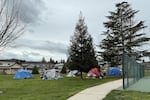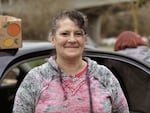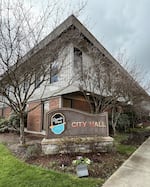Laura Gutowski lives just down the street from the Grants Pass home she resided in for 25 years. Her son used to play baseball in Morrison Centennial Park, where she now stays in a tent not far from the diamond. Her kids were born and raised in the neighborhood, the same place where her husband died unexpectedly in 2021.
“Still hard,” she said. “Still hurts.”

Homeless Grants Pass residents are required to move from one park to another every 72 hours under threat of citations or jail time. Neighbors say public parks have become unusable.
Jeremiah Hayden / Street Roots
Grants Pass is a city of 39,000 residents in southern Oregon’s Josephine County, an hour’s drive northwest of the California border on Interstate 5. It is nestled between the Siskiyou and Cascade mountain ranges, and the southern edge of its city center sits on the banks of the Rogue River. Baker, Tussing and Riverside Parks offer access to the Rogue, where crows gather near hotel lots and restaurant patios.
The city is also at the center of a U.S. Supreme Court case that is expected to have broad implications for homelessness policy across the entire country.
The court is scheduled to hear oral arguments in Grants Pass v. Johnson on April 22. Grants Pass says civil and criminal punishments are necessary for enforcing laws banning homeless individuals from public spaces. Lawyers representing a class of homeless residents argue penalizing people who have nowhere else to go constitutes cruel and unusual punishment — a violation of the Eighth Amendment.
The Oregon Law Center initially filed the class action lawsuit on behalf of Debra Blake in October 2018. Blake passed away in 2021, and Gloria Johnson and John Logan stepped in as class representatives as the case made its way through the appeals process.
Gutowski became homeless soon after her husband died. She can’t talk about him without choking up, sitting outside her tent, leg resting on a bucket holding a tarp down on the grass.
“It kind of all piled on at the same time,” she said. “Flipped my world upside down. I never expected to be out here for this long.”
Gutowski thought she’d be without a home for a month at the most, but a month tumbled into two. She spent the third month sleeping in her car after moving to a different park. More than two years later, she still considers herself part of the Grants Pass community but said the housed residents in the area don’t.
“It can happen to anybody,” she said. “Anybody at any time.”
The question at the center of Grants Pass v. Johnson is whether city ordinances leveling civil and criminal penalties against involuntarily homeless individuals constitute cruel and unusual punishment.
The city, for its part, was not shy about its approach from the beginning.
“The point is to make it uncomfortable”
On the afternoon of March 28, 2013, the Grants Pass city council held a community roundtable to “identify solutions to current vagrancy problems.” In its own words, the purpose was to “focus on developing strategies to modify behavior (and) connect people to services.” At that meeting, Lily Morgan, the council president, stated, “The point is to make it uncomfortable enough for them in our city so they will want to move on down the road.”
City code explicitly bars anyone from sleeping in public spaces, including parks, sidewalks and in cars, or using sleeping materials for the purpose of maintaining a temporary place to live, under threat of criminal and civil penalty. In city code, “parks” are defined as city halls, community centers, police and fire stations, parking lots, traffic islands or urban beautification areas owned or maintained by the city.
At times, the city has shut off the water in public parks and closed the restrooms, a tactic Josephine County Public Health voiced concern about, saying a lack of access to handwashing stations could have ripple effects in the broader community. Some homeless residents have no option but to use the Rogue River for bathing, restrooms and drinking water.
“They’re trying to put us in this situation, and put us in society’s view as what they would consider homeless, or how they view homeless in their minds,” Gutowski said.
”Housing as community infrastructure”
Doug Walker, a retired builder and member of the city’s Housing Advisory Committee, seems to never stop working. This winter, Walker and his team have been working to retrofit a building, turning it into an emergency shelter and navigation center, run by the local organization Mobile Integrative Navigation Team, or MINT.
Early one morning, Walker cut materials and delegated tasks inside “Parker’s Place,” a small building neighboring a charming used furniture store and a large Bi-Mart parking lot.
Inclement weather was expected to settle in, and MINT staff hoped to accommodate people the following weekend.

Local organization MINT provides mobile medical care to people living in local parks, and opened a small emergency shelter in early 2024.
Jeremiah Hayden / Street Roots
Walker said temporary shelters are part of the solution, but Grants Pass needs to get to work building more apartments and affordable housing. He said the current scenario is a result of the policies of the past 50 years.
“We have woefully underbuilt housing, and I think we have to start to look at housing as infrastructure — as community infrastructure,” Walker said.
Grants Pass has been under a district court injunction since July 2020, and a circuit court injunction since September 2022, barring the city from enforcing its ordinances. The 9th Circuit Court of Appeals held the lower court’s opinion that the ordinance violated the cruel and unusual punishment clause because Grants Pass residents had no other option for shelter.
The only consistent overnight shelter is the Gospel Rescue Mission, a high-barrier shelter, meaning clients are required to abstain from using substances, attend daily Christian services and abide by a host of other rules as a condition of their stay.
The Mission helps people develop routines during their stay. It also requires residents to turn over all medications and stay nicotine-free. It does not permit socializing between members of the opposite sex except at approved events. The Mission acknowledges gender and sexuality in “Biblical terms,” meaning residents must “dress and behave according to their birth gender,” according to its house rules.
Brian Bouteller, the Mission’s executive director, said he believes people need to be compelled to seek help, and the problem of homelessness is growing in Grants Pass because organizations are handing out material things like coats to people who choose to sleep in parks.
“They have the option to not sleep in the park,” he said. “I mean, we have forests all over the place.”
Asked if he believes the enforcement of city ordinances constitutes cruel and unusual punishment, Bouteller said he doesn’t believe it is. As an example, he said when he received a $300 speeding ticket as a teenager, it made him think about the way he drove and changed his behavior accordingly.
“It changed my desires because it was painful,” Bouteller said.
Walker said the Mission does help certain people, but the approach “doesn’t work for everybody.” Still, he said the idea that people should be made uncomfortable “is in the ethos” of many living in Grants Pass.
The 9th Circuit Court cited its Martin v. Boise decision from 2018 as the backdrop for the Grants Pass case. That ruling found the U.S. Constitution blocks cities from imposing criminal penalties for sitting, sleeping, or lying outside on public property upon homeless individuals who cannot obtain shelter.
The two cases are closely related, and liberal and conservative city and state governments across the West have argued the court’s injunctions obstruct them from resolving homelessness.
An amicus brief submitted by the city and county of San Francisco said the 9th Circuit Court’s decision has hamstrung its efforts.
“The homelessness crisis defies ready solutions,” the brief said. “By restricting San Francisco’s ability to enforce those laws, judicial intervention has thwarted both the city’s ability to provide services to persons experiencing homelessness and its ability to protect the health, safety, and welfare needs of its residents as a whole.”
Local and state governments, police departments and chambers of commerce across the West submitted additional briefs in support of Grants Pass, making similar claims.
Ed Johnson, the Oregon Law Center’s director of litigation, who brought the initial suit against Grants Pass, said the case is specifically about whether civil and criminal enforcement of anti-camping regulations violates the U.S. Constitution when people have no other place to go.
He said penalizing people in need of housing will do little to solve the larger problem.
“Some politicians and others are cynically and falsely blaming the judiciary for the homelessness crisis to distract the public and deflect blame for years of failed policies,” Johnson said.
Walker said no matter what he tries to do to address the housing shortage, he tends to face resistance. Glen Crest Cottages, a 14-unit housing project proposed in 2023, faced significant challenges from nearby neighbors, despite being a grant-funded project on donated land, specifically built for veterans.
“I think we have the right as tax-paying citizens to want to remain safe and have our property values remain the same as they currently are,” one complaint said. “It is questionable if we can even sell them if this development goes in.”
Walker said the Foundry Village project, a long, narrow piece of land alongside the railroad tracks offering 17 transitional housing pods, faced similar pushback. The project ultimately went through despite some community members’ objections that helping people only enables them.
Walker and his team worked for a year and a half to raise the money and spent another year building. He said half the people living at Foundry Village are ready to move into housing but can’t leave because there is nothing for them to move into.
“That’s the nut at the center of the thing,” Walker said.
“They’re so misunderstood”
People living in parks are required to move every 72 hours. Police officers come to parks every Monday and Thursday, hand out 72-hour eviction notices, and give $295 citations for something called “scattering rubbish,” a loosely defined term for any item officers find near a tent. Left unpaid, fines for violating camping ordinances increase to $537.60.
As police hand out penalties to local residents, MINT has negotiated a relatively workable schedule, offering to help residents move their tents every Saturday.
MINT began as a community project with Josephine County Public Health, providing vaccines to homeless residents in 2021. Leah Swanson, the county emergency preparedness coordinator, said she saw inequities between COVID-19 vaccine rates in people who were housed and those who were unhoused. So, she started a program to build trust and meet people where they were.
“That’s quintessential public health work,” Swanson said.
Cassy Leach, a nurse at a local hospital at the time, volunteered to help early on. As she built trust in the community, people started asking for other supplies, like the life-saving overdose reversal medication Narcan. Leach acquired some to give to people in the parks, and their work grew into a mobile service for multiple needs. That was the beginning of MINT.
The organization recently acquired a van and customized it to allow them to provide medical care in the parks. Bruce Murray, a retired internist, runs the medical team with his wife, whom he lovingly refers to as the “wound god.”
Murray said the medical situation is dire in Grants Pass parks due to a lack of access to basic hygiene services.
Alongside a small group of volunteers, Murray works with Leach and her colleague Jesseca Mueller — who refer to themselves as “Jay and Silent Bob” — checking in on people in the parks during the week. They ask about upcoming appointments and developments in the daily lives of the people they serve, nurturing personal connections with anyone who wants to talk.
“These people are just beautiful souls who have amazing stories, and they’re so misunderstood,” Leach said.
Murray said the city council and the community have been suspicious of what MINT is doing, and said it isn’t uncommon for people to drive through the park and take photos and videos to share on social media.
“They really don’t understand what we’re doing,” Murray said.
“The ‘crime’ of having a common cold”
City municipal code states if a person receives two or more citations within a year for violating park rules, officers can give an exclusion order, barring them from being in the park for 30 days under threat of criminal trespass. A person found guilty of criminal trespass can be punished with up to 30 days in jail and a $1,250 fine.
Brodia Minter, a Southern Oregon public defender, said in a matter of three weeks her clients Helen Cruz and her partner each received $295 citations for violating park use regulations, two separate $295 citations for camping in parks, followed by an exclusion order kicking them out of Morrison Park. She said court scheduling made it impossible for Cruz to have her day in court on the initial citations before officers issued the exclusion order, violating a right to due process.
“We’d tried to adjudicate them but she was getting an exclusion order and swept before those tickets were adjudicated,” Minter said. “There was literally nothing she could ever do to be doing it right.”

Helen Cruz has been repeatedly fined for sleeping in Grants Pass, despite having no other place to go. Between house cleaning jobs, Cruz delivers 100 food boxes once a week to people in parks.
Jeremiah Hayden / Street Roots
Cruz decided to appeal after reading a notice at the bottom of the exclusion orders saying she had the right to do so within two days of receiving the order. She was the first person in Grants Pass to appeal an exclusion order but had to wait for the proceeding until later that month. The city council ultimately upheld the order, barring them from Morrison Park from mid-July to mid-August.
Cruz lost everything when she was swept. She said police dumped an ice chest onto sentimental photos and important documents. Her blankets were soaked. She couldn’t set up her tent again because the police intentionally broke the tent poles.
“Everything was just destroyed,” Cruz said. “It took my self-esteem and … just stomped on it basically.”
Minter said unless the city is giving no-barrier shelter there are no legitimate options for people with no source of income.
That encapsulates the narrow question before the Supreme Court. The court is tasked with determining whether people can be punished for the involuntary status of being homeless. Johnson said decades of precedent holds that people cannot be punished for any involuntary status.
The 9th Circuit Court affirmed that basic principle in Martin v. Boise, saying, “A person cannot be prosecuted for involuntary conduct if it is an unavoidable consequence of one’s status.”
That decision was based in part on a 1962 Supreme Court case, Robinson v. California, which determined states cannot punish a person simply for the involuntary status of being addicted to the use of narcotics.
Justice Stewart’s majority opinion illustrated the cruelty of punishing a person for something they cannot help.
“Even one day in prison would be a cruel and unusual punishment for the ‘crime’ of having a common cold,” Stewart said.

The Siskiyou and Cascade mountain ranges surround Grants Pass. Homeless residents shelter in tents in parks, including Morrison Park, despite the threat of civil and criminal penalties.
Jeremiah Hayden / Street Roots
“I thought it was a lynch mob”
On May 17, 2023, three days after one homeless man killed another homeless man in Riverside Park, the city council held a public hearing and closed the park to all members of the public for one month.
During contentious public testimony, community members doubled down on the push to make homeless residents uncomfortable, calling to privatize the parks, saying Narcan was a “crutch,” and the idea of providing shelter was “crummy.”
“We’re just so scared,” one person said.
Cruz said she was planning to speak on behalf of the homeless residents, but backed down quickly when she saw the community’s ire.
“It’s kind of scary because these people were like — they were furious,” Cruz said. “I thought it was a lynch mob.”
Her fear is not unwarranted.
Vigilante groups have started harassing homeless residents, calling themselves park watch groups. They show up at the parks, harass and provoke homeless residents — slashing their tents, emptying shampoo bottles and scattering belongings.
Walker said some in the community misdirect anger, focusing on crime and drug use because it’s too difficult to address the fact that homelessness is a broad, societal issue affecting a diverse population, including young children.
The most recent Oregon Point-in-Time count, or PIT count, shows 756 school-age children were homeless in Josephine County in 2023. PIT counts are widely understood to be a substantial undercount but provide a baseline for annual homelessness statistics.
Organizations like Maslow Project work in Josephine and nearby Jackson County to help homeless kids with the resources they need. Many young people have moved into the nearby hills despite its danger and distance from services. Nicole Ritterbush, a case worker for Maslow Project, said that is a consequence of the city pushing people to the edges, where there is a lower threat of criminal penalties.
“The mental health stress and toll it takes on them to have to constantly be moving and not be able to sleep is not good,” Ritterbush said.
Phone service is less available out of town, meaning young homeless residents have a difficult time staying in school and connecting with case managers like Ritterbush who could help them integrate into other parts of society.
Gutowski knows the struggle of trying to stay in school while homeless. After her husband died and she lost her housing, she went back to college to study Family Support Services so she could support young people struggling with social and behavioral challenges. Without consistent access to electricity, she was often unable to keep her laptop charged, and she couldn’t afford gas to drive to and from school each day. She had to drop out after the first term.
“Which was irritating, because I had finally gotten up the guts to actually go to college in the first place,” she said.
Gutowski said it proves unfeasible to take steps out of homelessness in Grants Pass, as debts from citations become insurmountable, or police and vigilante groups provoke and harass people for various reasons — in her case, for doing her homework, she said.
Johnson said despite the national attention to the case, the Supreme Court’s decision may do little to materially change the situation in Oregon. ORS 195.530 and Article I, section 16 of the Oregon Constitution require city ordinances to be objectively reasonable regarding people experiencing homelessness. Still, the decision is likely to impact the way cities and states approach homelessness regardless of whether or not it is sound public policy.
“My fear is if cities are allowed to criminalize without any limitation, we’re going to wake up in a few years and we’re going to have twice as many homeless people as we have right now,” Johnson said.

Grants Pass is at the center of a U.S. Supreme Court case expected to broadly impact homelessness policy across the country.
Jeremiah Hayden / Street Roots
—
The U.S. Supreme Court will hear arguments for Grants Pass v. Johnson April 22 in Washington, D.C. Street Roots will be there reporting in a media collaboration with Oregon Public Broadcasting.



